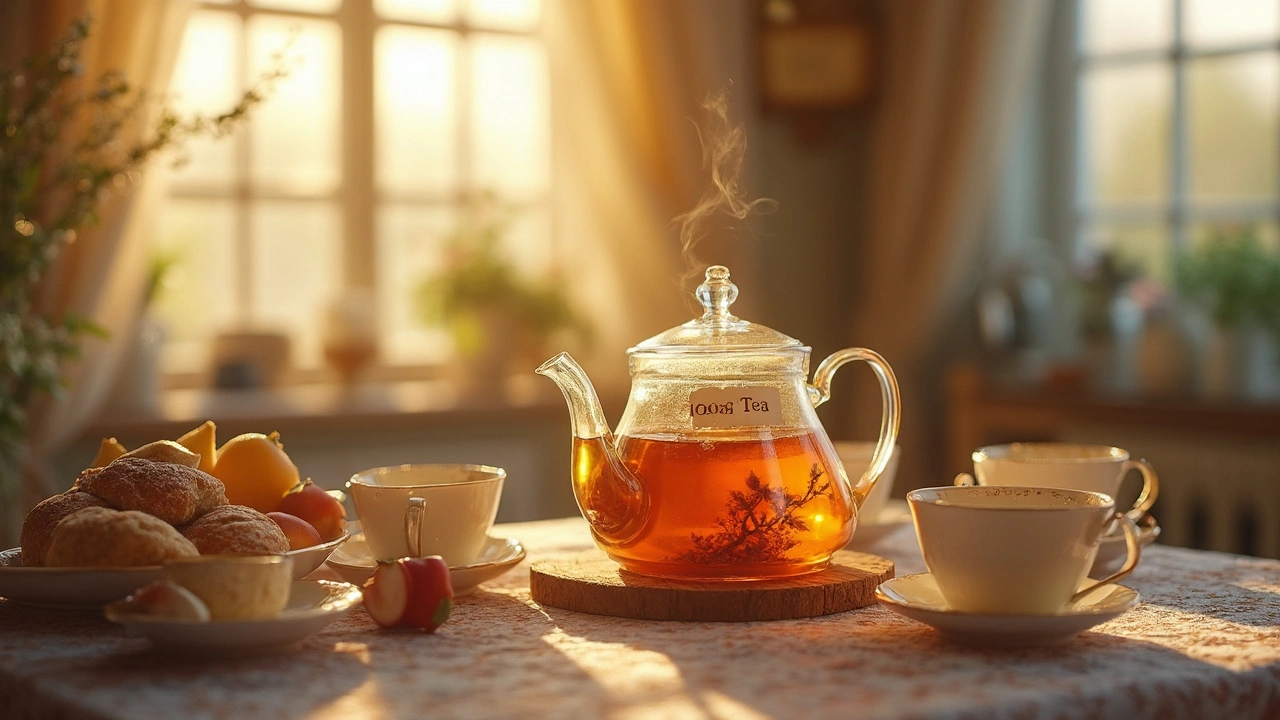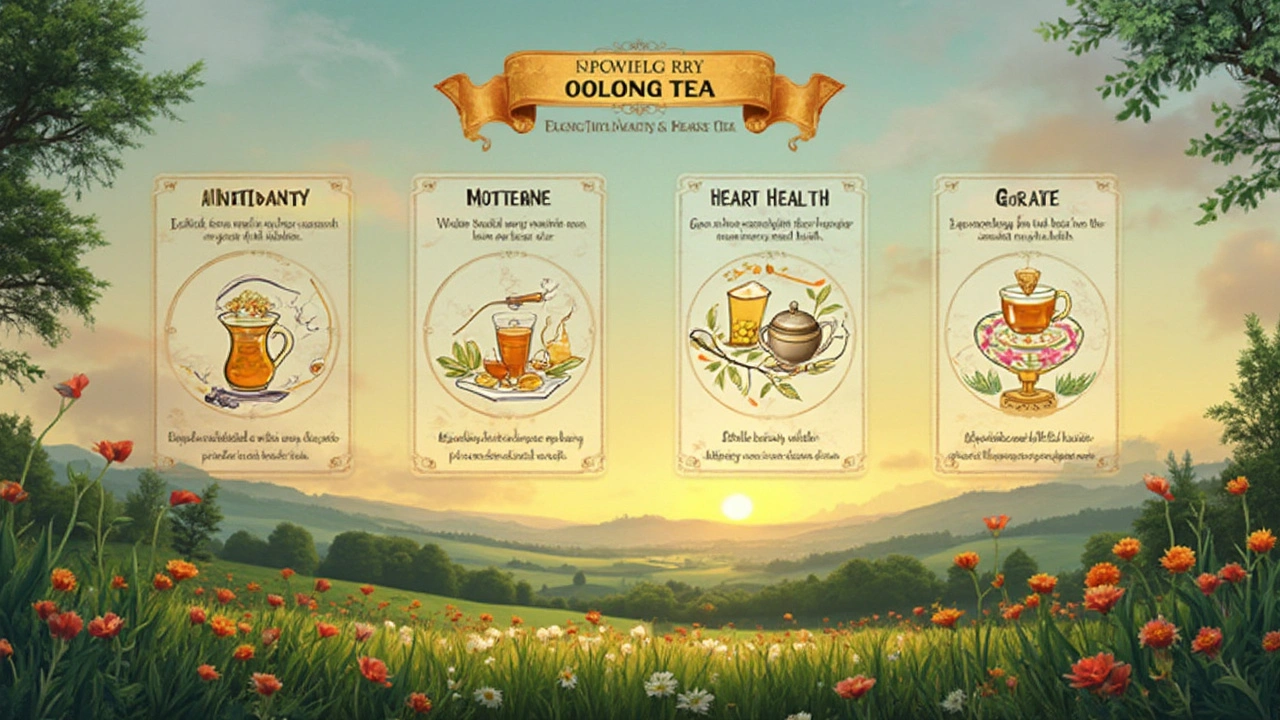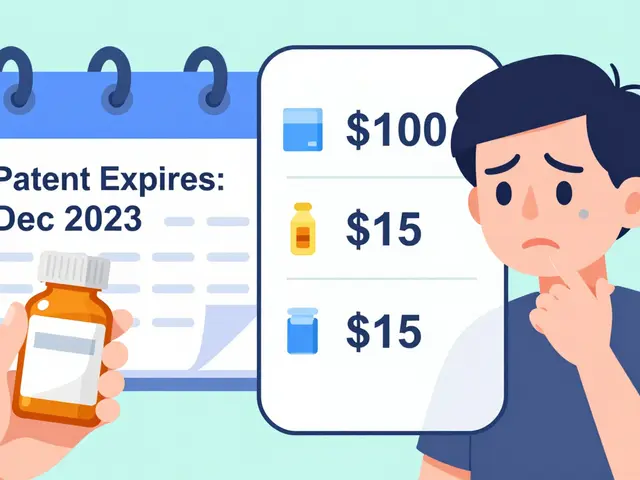
Ever thought a simple tea could be your ticket to a healthier lifestyle? Enter oolong tea. It's that underestimated cup sitting quietly between green and black teas, loaded with benefits that pack a punch. Whether you're on a diet journey or just looking to boost your overall well-being, oolong tea can be a game-changer.
So, what makes oolong tea stand out? First off, it's like the magical middle child of teas – containing properties of both green and black tea. This means you get a fantastic mix of compounds like catechins and caffeine, which work wonders in revving up your metabolism. That’s not all; studies have shown that oolong tea can even help with burning fat more efficiently. Imagine sipping your way to weight loss – sounds too good to be true? Well, science backs it up.
- What is Oolong Tea?
- Health Benefits of Oolong Tea
- Making Oolong Tea a Part of Your Diet
- Tips for Buying and Brewing Oolong Tea
- Potential Side Effects and Considerations
What is Oolong Tea?
Oolong tea is that delightful middle ground between green and black tea, offering a unique taste profile and a plethora of health benefits. Hailing from China and Taiwan, this tea undergoes a special semi-oxidation process, which gives it characteristics of both its green and black relatives. It’s this processing that makes oolong tea quite special, providing a mix of flavors that range from floral to fruity, and sometimes even nutty.
The semi-oxidation level generally ranges from 10% to 85%, giving each batch its distinct flavor and aroma. This means that no two batches are exactly alike, keeping your tea-drinking experience fresh and exciting.
Oolong Tea isn’t just about taste, though. It’s rich in antioxidants, which are those wonderful chemical compounds that help fight off stress and disease in the body.
"Oolong tea is a traditional Chinese tea with a bold, complex flavor. Its health benefits range from boosting metabolism to improving mental alertness," says Dr. Lin Huang from the Tea Research Institute in Fujian.
The bold flavors of oolong are just one reason to love it. What's even more amazing are its potential health benefits. For those who love a bit of history, oolong has been cherished for centuries, heavily influencing tea culture, especially within China.
The Process of Making Oolong Tea
To make it, tea leaves are withered under the strong sun and then oxidized before curling and twisting. The level of oxidation that oolong undergoes varies greatly, which gives it the sweet spot of flavors.
- Withering: Fresh tea leaves are spread out under the sun to remove excess moisture.
- Cooling and Bruising: Leaves are cooled and then gently bruised to enhance oxidation.
- Oxidation: Leaves are left to oxidize to a specific level, defining the flavor profile.
- Firing: Finally, leaves are roasted and dried to halt oxidation and lock in the flavor.
Oolong tea is not just a beverage; it's an experience. Whether you're a tea newbie or a seasoned sipper, adding oolong to your pantry is definitely worth considering.
Health Benefits of Oolong Tea
It's wild how something as simple as oolong tea can offer so much goodness. Here’s the lowdown on how this incredible tea can positively impact your life.
Boosts Metabolism
You might not believe it, but oolong tea is a pro at firing up your metabolism. Thanks to the powerful combo of catechins and caffeine, it gives your body a nudge to burn calories more efficiently. It's like having a personal trainer in a cup!
Weight Management
Say goodbye to fad diets and hello to oolong tea. Regular consumption has been linked to decreased body fat. It doesn't just burn fat; it can also help curb cravings, making it easier to control your snacks throughout the day.
Heart Health
Your heart will thank you for making oolong tea a habit. Studies suggest it can help lower “bad” LDL cholesterol levels, reducing the risk of cardiovascular disease. Plus, it supports good blood circulation, which is always a win.
Mental Clarity
If you often find yourself hitting a mental block, oolong tea might be the pick-me-up you need. It contains amino acids that support brain health, keeping your mind sharp and alert throughout the day.
Antioxidant Powerhouse
Loaded with antioxidants, oolong tea battles those nasty free radicals in our bodies. This means it helps prevent premature aging and keeps your skin looking fresh and youthful.
| Benefit | Effectiveness |
|---|---|
| Metabolism | High |
| Weight Management | Moderate |
| Heart Health | Moderate |
| Mental Clarity | High |
| Antioxidants | High |
And there you have it, a breakdown of why oolong tea should be your new daily ritual. It’s not just a drink; it’s a lifestyle change packed with tangible benefits for your health.

Making Oolong Tea a Part of Your Diet
Getting started with oolong tea is easier than you might think. Here are some tips to seamlessly introduce this wonder drink into your daily routine.
Start Your Day Right
Why not swap out your usual morning coffee for a cup of oolong tea? The caffeine content in oolong is enough to give you a gentle boost without the jitters. Just steep a teaspoon of oolong leaves in hot water (around 190°F) for 3 to 5 minutes, and you're good to go!
Midday Pick-Me-Up
If you're hitting an afternoon slump, skip the sugary snacks and go for a cup of oolong instead. Its combination of caffeine and antioxidants can help enhance mental alertness. A little sip might just be what you need to power through the rest of your day.
Pair with Meals
Drinking oolong tea with meals can aid digestion—it's especially good with fatty foods. Plus, if you're on a weight management plan, oolong can help you stay on track thanks to its metabolism-boosting properties. Enjoy it hot or cold; it's versatile either way!
Savoring Oolong as Iced Tea
Ready for a refreshing twist? Iced oolong is an excellent option. Brew a pot of oolong, let it cool, and pour over ice. Add a slice of lemon or mint leaves for an extra kick. It's perfect for sipping on hot summer days.
Experiment with Flavors
If you're feeling adventurous, try blending oolong with other teas or infusing it with natural spices like cinnamon or ginger. This adds new dimensions to the flavor and keeps your palate interested.
Finding the Right Balance
While oolong is fantastic, moderation is key. Aim for about two to three cups daily to maximize benefits without overdoing it. Remember, everyone's tolerance is different, so listen to your body. Keep an eye on your caffeine intake, especially if you're having other caffeinated drinks.
Tips for Buying and Brewing Oolong Tea
Choosing the right oolong tea can make a big difference in both flavor and benefits. Here's what to keep in mind.
1. Buying Oolong Tea
- Origin Matters: Generally, oolong tea from Taiwan and Fujian in China is top-notch. These regions are known for producing high-quality tea leaves.
- Loose Leaves Over Teabags: Whenever possible, go for loose leaves. They often preserve the flavor and nutrients better than leaves crushed into teabags.
- Check for Freshness: Buy from a trusted source to ensure your tea hasn’t been sitting on the shelf for too long.
- Organic Options: Consider organic oolong tea to avoid pesticides. It can be a bit pricier, but the clean taste is worth it.
2. Brewing Tips
Brewing oolong tea the right way enhances its rich and mellow taste. Here's how to do it.
- Get the Water Right: Heat water to about 190°F (87°C). If it boils, just let it cool down for a minute or two.
- Steep with Care: Add about one teaspoon of tea per cup and steep for 3-5 minutes. The first brewing should be short to awaken the leaves. Later brews can be longer.
- Multiple Infusions: Oolong tea is great for multiple brews. Don’t toss the leaves after one use; you can steep the same leaves multiple times.
"Oolong tea deserves its spot in the limelight. Its unique flavor and health benefits can be savored by tea connoisseurs and newbies alike," says Christine Shan, editor at Global Tea Review.
Remember that the art of brewing is also about personal preference. Don’t be afraid to experiment until you find the perfect brew that suits your taste. Happy brewing!

Potential Side Effects and Considerations
Drinking Oolong Tea is generally safe for most people, but like with any good thing, there are a few side notes to keep in mind. The main concern here is caffeine, which oolong contains a fair amount of. Too much caffeine can lead to a jittery feeling, increased heart rate, or even insomnia if you're not careful. So, if you're sensitive to caffeine, you might want to ease into it or maybe enjoy it earlier in the day.
Caffeine and Its Effects
Oolong tea generally has less caffeine than black tea but more than green tea. If you've switched from coffee to tea thinking you're cutting down the caffeine, keep that in mind. The caffeine content can vary depending on how long you brew it, so feel free to experiment with steep times to find your comfortable spot.
Dietary Considerations
If you're on medication or have health conditions, especially related to the heart or anxiety, chat with your doctor before making oolong tea a regular part of your diet. It can also impact the absorption of iron, so if you're anemic, it's best to have your tea between meals.
Quality Matters
Not all oolong tea brands are created equal, and quality can really affect both the taste and the health benefits. Go for trusted brands, and check the labels for any added ingredients. Pure oolong tea should, ideally, just be tea leaves.
Daily Consumption
If you're unsure about how much oolong to consume, starting with 1-2 cups a day is a safe bet. You can increase or decrease this based on how your body responds. Remember, it's about making it work for you, not against.
| Brewing Time | Caffeine Content |
|---|---|
| 1 minute | 30mg |
| 5 minutes | 50mg |
The takeaway? While Oolong Tea can do wonders for your diet and health, it's all about finding the right balance. A bit of moderation and a pinch of caution, and you're set to enjoy all those amazing benefits without a hitch.




Clarise Wheller
July 18, 2025 AT 14:58Oolong tea has always been a slightly underrated gem in the tea world, so I'm really happy to see it getting some spotlight here! It's not just about taste; the health benefits really make it stand out. I especially love how it helps with both weight management and mental clarity—it feels like a win-win.
Has anyone tried switching from green tea to oolong and noticed a difference in energy levels or metabolism? I'm curious because both teas have caffeine but their effects feel so different to me. Plus, it's great that it packs antioxidants; those are so essential for overall well-being.
Also, I wonder if there's a best time of day to drink oolong for maximum benefits? Would love to hear other people's routines or tips.
Riley Fox
July 20, 2025 AT 03:23Well, let's not get ahead of ourselves with calling oolong tea the most powerful supplement, shall we? 😉
While I appreciate the enthusiasm, it's crucial to back up those claims with solid scientific data.
Antioxidants and catechins—yes, those are definitely beneficial, but saying it 'revolutionizes' your diet sounds a bit dramatic to me.
Also, caffeine content varies hugely in teas; some people might overdo it without realizing. So moderation is key.
Anyway, I’ll give it a try but with tempered expectations.
David Stephen
July 21, 2025 AT 15:48I've incorporated oolong tea into my daily routine for a few months now and I've noticed a subtle but steady boost in my energy and focus. It doesn’t give me the jitteriness that coffee sometimes does, which is a huge plus for me.
From my perspective, the benefits mentioned here about metabolism and heart health are consistent with what I've read in various studies. But of course, it’s never a magic bullet; pairing it with a balanced diet and exercise is key. Still, it feels like a great natural complement.
Anyone else find it helps with mental clarity as touted?
Roberta Giaimo
July 23, 2025 AT 04:13Grammar aside, I love how oolong tea combines a bit of caffeine and antioxidants that actually work nicely together. :)
The post really highlights some good points about how this tea can be a dietary supplement rather than just a casual drink. I personally enjoy it in the afternoon to avoid caffeine keeping me up late.
Plus, the taste! It’s not too strong, not too mild—just right for any tea lover. Does anyone else blend it with other herbs or flavors?
Tom Druyts
July 24, 2025 AT 16:38Hey all! Just wanted to jump in and say I’m a huge fan of oolong tea. Honestly, it’s become my go-to when I want something to help me stay alert without the crash I get from coffee. Plus, the weight management benefits are a real bonus.
What I appreciate most is how versatile it is—you can drink it hot or iced, and it pairs well with so many flavors. For anyone doubtin', give it a solid month and watch how your energy and digestion may improve.
Julia C
July 26, 2025 AT 05:03Sure, oolong tea sounds great, but has anyone really tested the long-term effects? Or are we just buying into health hype again? It’s suspicious how these teas suddenly get labeled as miracle supplements.
Also, let's be real—if you’re drinking oolong tea because you think it’ll solve all your weight problems, you’re probably fooling yourself. Nothing replaces good old diet and exercise.
And what about the caffeine? Too much can cause anxiety and sleep problems, so let’s not pretend it’s totally harmless.
John Blas
July 27, 2025 AT 17:28Honestly, I tried oolong tea for a couple weeks and didn’t notice anything special. Maybe I wasn’t patient enough or it’s just placebo effects blown out of proportion.
Still, it’s a tasty beverage, so no harm. But no way it’s some super dietary supplement that’ll fix everything.
Lexi Benson
July 29, 2025 AT 05:53Not to sound too ironic, but 'most powerful dietary supplement' is quite a label for a tea. 😏
That said, it's fascinating how the catechins and caffeine combo can impact metabolism and mental clarity. I've found that it does help me stay calm and focused without the jittery feeling coffee brings. So that’s a real plus.
Curious though: does anyone know if there are any downsides or warnings about drinking too much oolong tea?
Vera REA
July 30, 2025 AT 18:18From a cultural perspective, oolong tea has been cherished in many Asian countries for centuries. It's interesting how modern science is now catching up to explain what they've known intuitively for ages.
The antioxidants and catechin content are indeed notable, and as a milder alternative to black or green tea, it offers a unique flavor and health profile.
But I agree with some others that it shouldn’t be seen as a miracle cure. For me, it’s about enjoying a holistic approach to wellness.
Vikas Kale
August 1, 2025 AT 06:43Just to add a bit of scientific jargon here: oolong tea’s bioactive compounds like polyphenols and methylxanthines interact synergistically to enhance metabolic rate via thermogenesis. The catechins inhibit catechol-O-methyltransferase (COMT), which prolongs the action of norepinephrine, thereby promoting fat oxidation.
However, individual response varies depending on genetic polymorphisms related to caffeine metabolism (CYP1A2 enzyme), so not everyone experiences the same benefits.
It’s excellent that this post encourages consumption as part of a comprehensive wellness plan rather than relying on it solely.
Amanda Devik
August 2, 2025 AT 19:08Omg, I am sooo here for this oolong tea hype! I switched about 3 months ago, replacing my afternoon coffee with a warm cup of oolong, and honestly, it’s the best decision EVER.
My energy feels more stable throughout the day, I notice fewer sugar cravings, and I feel less bloated. Plus, it gives me this calm focus that really helps when the workload piles up.
Definitely gold for anyone looking to tweak their daily routine without going nuts on supplements.
If you’re on the fence, just do it and watch how your body responds!
Clarise Wheller
August 4, 2025 AT 07:33@Julia C and @John Blas, I totally get where you’re coming from—skepticism is healthy, especially when health trends often exaggerate benefits.
That said, I've found that reasonable consumption of oolong tea is a yummy way to support your body but definitely not a fix-all. It’s about balance and enjoying the process.
Maybe the hype comes from combining traditional knowledge with emerging science that’s still developing, so letting time and research guide us might be best.
Curtain call for oolong: lovely tea, solid benefits, but not a magic potion. :)